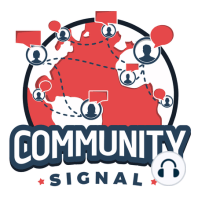46 min listen
Level Up Your Community with Amy Jo Kim’s Principles of Game Thinking
FromCommunity Signal
ratings:
Length:
52 minutes
Released:
Aug 17, 2020
Format:
Podcast episode
Description
Amy Jo Kim‘s work building social systems and online experiences for The Sims, Rock Band, Ultima Online, and the New York Times, to name a few, makes her an industry go-to when businesses and clients have questions about creating engaging experiences for gamers, shoppers, and more. Amy Jo is the author of Community Building on the Web (2000) and Game Thinking (2018). While some think of her as a community professional because of her writing and others know her more for her work in games, Amy Jo sees her work as continuous and intertwined. She was tackling questions around user incentives and gamification decades ago and even then she thought, “is it too late for me to write a book?” Let’s all take that as a lesson that it’s never too late to share what we’ve learned and then, as she says: “Keep going, keep getting better, keep developing new frameworks that give people value.” Patrick and Amy Jo also discuss: Amy Jo’s experience getting a community book published in 2000 Why simply just implementing “PBL” (points, badges, and leaderboards) likely won’t take your community very far Focusing on the “middle” of your community experience How inclusivity and diversity factor into game thinking Our Podcast is Made Possible By… If you enjoy our show, please know that it’s only possible with the generous support of our sponsors: Vanilla, a one-stop shop for online community and Localist, plan, promote, and measure events for your community. Big Quotes Writing a community book in the late 1990s (3:40): “The thing that motivated me to write [Community Building on the Web] was … that, although this was a new medium, and we were dealing with tech-enabled communities, people are people and the dynamics that have always made communities rise or fall are pretty much the same, whether you’re digital or not. … [In the late ’90s], there was a lot of, as there is now, breathless hoopla about, ‘Oh, it’s completely new. We’ve never seen anything like this.’ Yet I felt that there was all this older wisdom about communities that was readily available to us if we wanted to learn from it.” –@amyjokim Sharing your industry experience (6:00): “If you’ve got something valuable to say, if you can say it in a compelling way people understand; [being] late/early doesn’t matter so much. … Get the thing that you have to state out into the world so people can react to it. That’s an incredibly powerful thing.” –@amyjokim Be thoughtful about your gamification practices (20:42): “If you want to capture the magic of games in your product, it really has a lot more to do with building the right systems than sprinkling [points, badges, and leaderboards] on top.” –@amyjokim Give your superusers the opportunity to make an impact (35:46): “Find some way for your most dedicated customers to play a role in the community that gives them impact. People like swag, they like being paid, they like being praised. They like all of that, but there’s nothing that can beat having an impact on a community you care about.” –@amyjokim Making diversity part of your design process (41:04): “If you’re building something new, and you want it to be inclusive, find people from a variety of socioeconomic backgrounds, different skin tones, different religions, whatever it is that you want to be inclusive about. Actively recruit early adopters from those groups and make sure that their voice is heard at the beginning and then throughout.” –@amyjokim Onboarding is important, but… (47:36): “There are so many apps, communities, marketplaces, and services that fail because they [just] have great onboarding. They took to heart that onboarding is so important. … What about day five? What about day ten? There’s nothing there. It’s so common. The reason it’s common is it’s much easier to design pretty onboarding than to figure out your core loop. It’s actually the hardest part. It’s the part that’s going to drive retention.” –@amyjokim About Amy Jo Kim Named by Fortune as one of the top
Released:
Aug 17, 2020
Format:
Podcast episode
Titles in the series (100)
Build Something People Care Enough to Get Angry About: Jason Falls knows where your customers are talking. He’s studied conversations for several years and, time and time again, he’s shed light on an inconvenient truth for brands. by Community Signal
